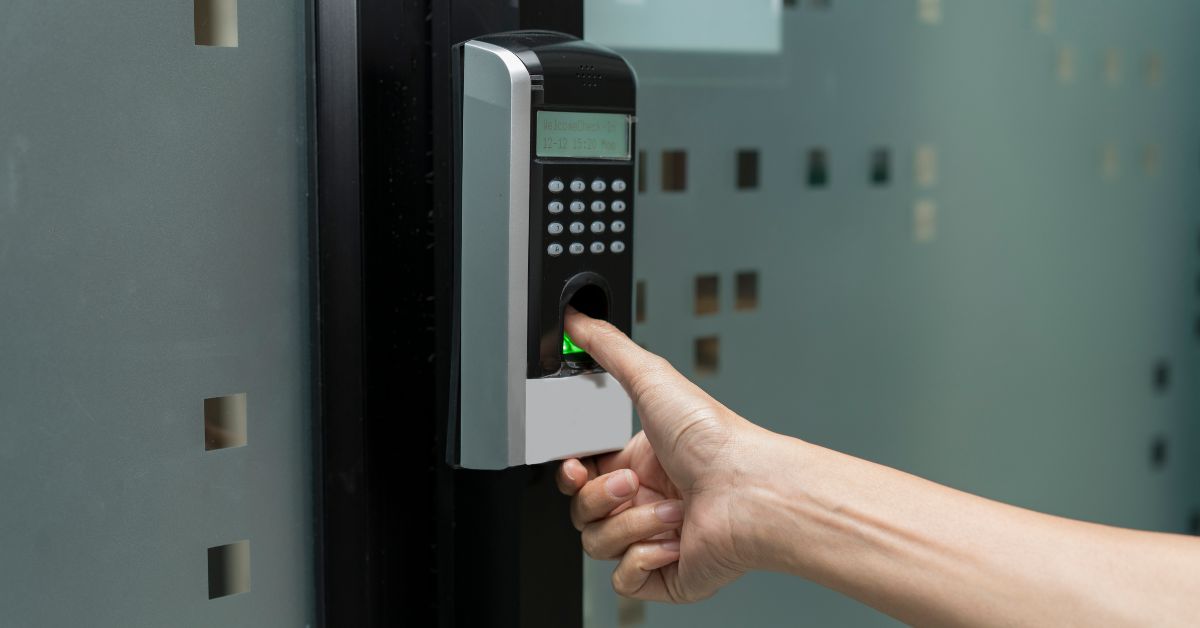What is a biometric lock?
Summary of the Article:
Biometric locks are highly secure and provide maximum control over access to your premises. They use fingerprint credentials, which cannot be lost or stolen like physical keys. These locks offer unmatched security and cannot be tampered with. They automatically lock when the door is shut, ensuring safety. Biometric locks also have an aesthetic appeal and create a good first impression. They are fast, convenient, and economical.
However, one weakness of biometric locks is that the technology is not flawless. There can be occasional errors or false rejections, which can be a drawback. Nevertheless, biometric locks are still considered one of the most secure types of commercial smart locks.
Questions and Answers:
- How safe are biometric locks?
- What is the meaning of a biometric lock?
- What are the benefits of biometric locks?
- Maximum control over who enters your home or premises.
- Unmatched security compared to traditional locks.
- Tamper-proof design that cannot be easily manipulated.
- Automatic locking when the door is shut, ensuring safety.
- Aesthetically pleasing and creates a good first impression.
- Fast and convenient to use.
- More economical in the long run.
- What is a weakness of biometric locks?
- Can the police unlock your phone with biometrics?
- What happens when biometrics are locked?
- Can I turn off biometrics?
- Is biometrics safer than a strong password?
- What are the two main disadvantages of using biometric security?
- Costs – Significant investment is required for implementing biometric security.
- Data breaches – Biometric databases can still be hacked, compromising the security of the stored biometric data.
- Tracking and privacy concerns – Biometric systems, like facial recognition, can raise privacy issues as they track and store individuals’ biometric data.
- Why are biometrics hard to hack?
- What can hackers do with biometrics?
Biometric locks, such as fingerprint locks, are more secure than traditional locks. Fingerprint credentials cannot be lost, stolen, or misplaced like physical keys. Therefore, biometric locks are highly secure and offer maximum protection.
Biometric locking/unlocking is a service that allows an individual to lock and temporarily unlock their biometrics, such as fingerprints or iris scans. This feature aims to enhance privacy and confidentiality of an individual’s biometric data.
There are several benefits of using biometric locks:
A major weakness of biometric locks is that the technology is not flawless. There can be occasional errors or false rejections, which can pose inconveniences for the users.
Currently, police officers have the authority to demand that you unlock your mobile phone using face recognition or fingerprint identification. However, they cannot force you to disclose your passcode or pattern.
Locked biometrics mean that an individual’s biometric data, such as fingerprints, iris scans, or face recognition, cannot be used for authentication. This prevents any unauthorized entity from performing biometric-based authentication for that individual.
Yes, you can turn off biometrics on your mobile device by going to the settings. Navigate to “Lock Screen and Security” and then select “Screen Lock Type.” From there, you can toggle off all the options under the biometrics section.
Biometrics and strong passwords, when used correctly, can both provide secure access to your devices or apps. While a password is something you enter upon login, biometrics systems use unique physical characteristics, such as fingerprints or facial features, to identify you.
The two main disadvantages of biometric security are:
Biometrics are hard to hack because they are unique to each individual and cannot be easily replicated. Additionally, biometrics can be used in conjunction with other forms of authentication, such as passwords or PINs, adding an extra layer of security.
If hackers manage to obtain someone’s biometric data, such as fingerprints or iris scans, they can potentially impersonate the victim and gain unauthorized access to their accounts or confidential information. Biometric data is valuable and cannot be easily changed, making it an attractive target for hackers.

How safe are biometric locks
Fingerprint locks are more secure than traditional locks because fingerprint credentials can't be lost, stolen, or misplaced in the same way that physical keys can. For this reason, biometric locks are one of the most secure types of commercial smart locks.
What is the meaning of biometric lock
What is Biometric Locking keyboard_arrow_down. Biometric Locking/Unlocking is a service that allows an Aadhaar holder to lock and temporarily unlock their biometrics. This facility aims to strengthen privacy and confidentiality of Resident's Biometrics Data.
What are the benefits of biometric lock
7 benefits of fingerprint door locksMaximum control over who enters your home.Unmatched security.You cannot tamper with these door locks.The door automatically locks when it gets shut.They look great and set off a great first impression.Speed.More economical.
Cached
What is a weakness of biometric locks
A major weakness of biometric locks is that the technology isn't flawless.
Can police unlock your phone with biometrics
Currently, police officers have the authority to demand that you unlock your mobile phone using face recognition and fingerprint identification. When unlocking your phone, police officers have no right to demand that you disclose your passcode or pattern.
What happens when biometrics is locked
Locked Biometrics confirms that Aadhaar holder will not be able to use Biometrics (fingerprints/iris/Face) for authentication, it is a safety feature to stop any kind of biometric authentication. It also ensures that any entity by any means cannot perform biometric based Aadhaar authentication for that Aadhaar holder.
Can I turn off biometrics
Open Settings > Lock Screen and Security > Screen Lock Type and toggle off all the options under the Biometrics section.
Is biometrics safer than a strong password
Whereas a password is a phrase you enter upon login, biometrics systems use something unique to your person, such as fingerprints, voice characteristics or retina patterns to identify you. Biometrics and secure passwords used correctly can help keep your devices or apps secure.
What are the two main disadvantages of using biometric security
Disadvantages of biometric authenticationCosts – Significant investment needed in biometrics for security.Data breaches – Biometric databases can still be hacked.Tracking and data – Biometric devices like facial recognition systems can limit privacy for users.
Why are biometrics hard to hack
This is because biometrics are unique to each individual and cannot be easily replicated. Biometrics can be used in conjunction with other forms of authentication, such as a password or PIN. This provides an additional layer of security and makes it more difficult for someone to gain access to your account.
What can hackers do with biometrics
Once the attacker has obtained the biometric data, they can use it to impersonate the victim and gain access to their accounts or confidential information. Biometric data is unique to each individual and cannot be easily changed, making it a valuable target for hackers.
What is biometrics used for in law enforcement
Mobile biometric technology includes mobile devices and apps that police use to capture and analyze a person's physical features in the field and submit that information to a central database for matching. Ostensibly, police deploy this technology as a means to confirm the identity of someone during a stop.
How do I unlock a locked biometrics
The biometric unlock can be done by resident either by visiting UIDAI website, enrolment centre, Aadhaar Seva Kendra(ASK), through m-Aadhaar. Note: Registered Mobile Number is essential to avail this service.
Can police force you to unlock your phone with biometrics
It's Often Up to You and Your Phone's Lock Method
Currently, police officers have the authority to demand that you unlock your mobile phone using face recognition and fingerprint identification. When unlocking your phone, police officers have no right to demand that you disclose your passcode or pattern.
Are biometrics good or bad
For the average person just trying to go about their day without having their phone and all the data within compromised, biometric identification is an excellent solution.
Can biometric password be hacked
While biometric data can be hacked, it is still more secure than other forms of identification. This is because it is much harder to fake a fingerprint or iris than to guess a password or PIN.
What are the risks and dangers of biometrics
Disadvantages of biometric authenticationCosts – Significant investment needed in biometrics for security.Data breaches – Biometric databases can still be hacked.Tracking and data – Biometric devices like facial recognition systems can limit privacy for users.
Which is the safest biometric security
Iris recognition is widely considered to be the most accurate modality of biometric identification.
Are biometrics hard to hack
While biometric data can be hacked, it is still more secure than other forms of identification. This is because it is much harder to fake a fingerprint or iris than to guess a password or PIN.
Why are biometrics unsafe
Biometric data is easy to copy. The biggest problem with a non-secret authentication factor is that they are easy to copy for malicious reuse. Your fingerprints and face are literally everywhere and can easily be captured, copied and reused.
Can someone steal your identity with your fingerprint
Can Hackers Steal Your Identity With Your Fingerprints The short answer is, yes. For most people, the greatest danger of fingerprint theft is identity fraud. Stolen fingerprints can be used to access secure devices like your phone or laptop.
What biometrics are used in criminal investigation
No two individuals, not even identical twins, have the exact same identifiers – be it fingerprints, irises, voice scans or faceprints. This makes biometric identification an extremely important tool for law enforcement agencies, who can use it reliably as part of background checks and criminal investigations.
How do I disable biometric lock
Open Settings > Lock Screen and Security > Screen Lock Type and toggle off all the options under the Biometrics section.
Can you refuse biometrics
Employees can refuse to provide biometric scans, but employers can terminate them for it.
Can police remotely access my phone
This technology is primarily used to aid in criminal investigations. However, the catch here is the word "remotely". The fact is, in most jurisdictions, police cannot remotely access your phone without a warrant or your explicit consent.



0 Comments